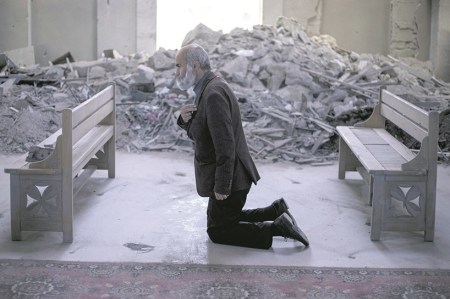Armenia-Azerbaijan conflict is genocide, not another fight: human rights head

There’s a genocide of Armenian Christians, according to the head of a human rights group, but it’s largely going unnoticed because of conflicts between world powers.
Although people often perceive the conflict between Armenia and Azerbaijan as another forgotten and meaningless conflict in a distant part of the world, it’s actually a genocide of Christians that springs from over a 100 years of history, Christian Solidarity International President John Eibner told The Christian Post. Disinformation campaigns by the government of Azerbaijan have covered up the truth.
Armenia and Azerbaijan are in conflict over a small area of land called Nagorno-Karabakh. The area is claimed by a small, independent Armenian republic.
“From an Armenian perspective, this area is their historic homeland. There are many different ways to describe it. Armenians will say this is part of Armenia, but it is not formally a part of the state of Armenia,” said Eibner.
Internationally, Nagorno-Karabakh is recognized as Azerbaijani land, but it’s mostly populated by Armenians and self-governed. After six weeks of war, Russia brokered a peace deal last year that left Armenia in control of most of the land and Azerbaijan in control of the rest. The conflict killed thousands and displaced hundreds of thousands.
“It’s not just a local pushing and shoving. This problem has erupted as a part of a longer historical process and it’s erupted now because local geopolitical conditions have enabled it to erupt,” said Eibner.
In 1915, the Muslim Ottoman Empire killed over 1.5 million Armenians. Turkey still refuses to admit today that the event was a genocide. Most Armenians are Christians, and Armenia was the first nation to establish Christianity as a state religion. Azerbaijan was once a province of the Ottoman Empire, and human rights groups have called out ongoing discrimination against Armenians and “state-supported policy of Armenophobia.”
“People don’t understand Azerbaijanis are Turks. They speak a dialect of Turkish,” said Eibner. “Whenever there is a weakening in the protection that Armenians have and confusion in the international system, there’s another attempt to drive Armenians out of their lands.”
The last major attack on the Armenians happened in the 1990s, he said. Because Russia is the major Christian power in the region, Armenia usually works with Russia for protection from its Islamic neighbors. Eibner believes American leaders often don’t pay attention to threats to Armenia because Russia and the United States rival each other.
The United States works with Azerbaijan to oppose Iran. Because Azerbaijan borders Iran, American leaders give it money in exchange for a presence in the country, said Eibner.
Support from America, Israel and NATO to oppose Iran makes local leaders feel they have free rein. Often, American leaders do a better job of advocating for persecuted Christians in countries where they are strategically useful, he contended.
“Why does Azerbaijan feel empowered to make another move? It has done so because it has become oil rich. It has done so because it’s a member of NATO. It has done so because it has received sophisticated drones from Israel. It feels it has the cover to do so,” he said.
To cover up its genocidal attacks on Armenians, Azerbaijan has publicized stories of Armenian war crimes while minimizing its own, said Eibner. Atrocities happen in every war, but evidence suggests that Azerbaijan’s atrocities are far worse than the atrocities on the Armenian side. Azerbaijani communities have not suffered the way Armenian ones have.
“Information warfare is a part of any war. One has to understand not to take anything one hears from either side at face value,” he said. “Who lost? Where are the Armenians now who lived in areas now controlled by Azerbaijan? Why aren’t they living in their own homes today?”
In Turkey and in Islamic warfare, victors in war have a long tradition of treating the losers as less than human, said Eibner.
Christians who want to help Armenians should write their leaders in Congress, connect with local Armenian organizations and ask their pastors to speak about these issues in church, Eibner said.
“This is a tragedy at many different levels. People are homeless, people are killed, but it’s very much connected with the disappearance of Christians,” he said. “Washington has cared much more about Chinese Christians that Christians in Nagorno-Karabakh. If the trend continues, there simply won’t be viable Christian communities in the Middle East.”





















